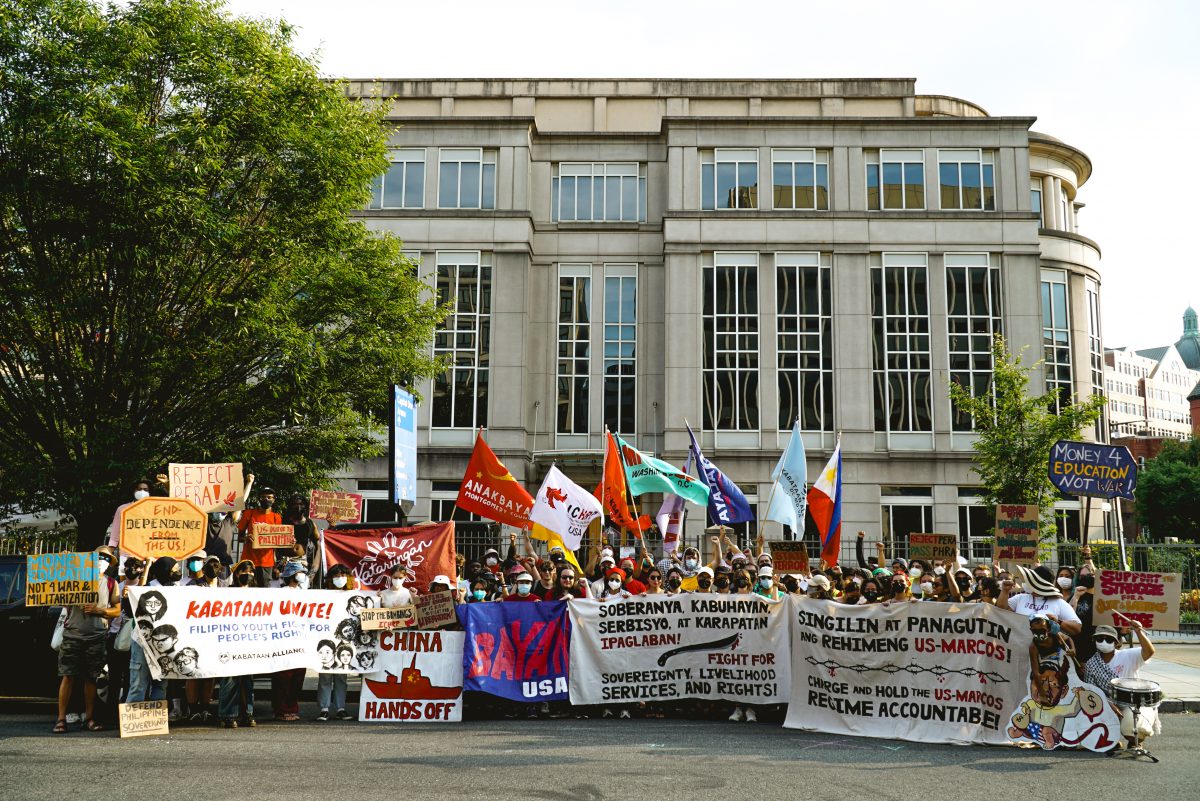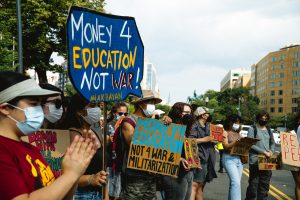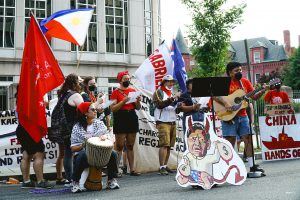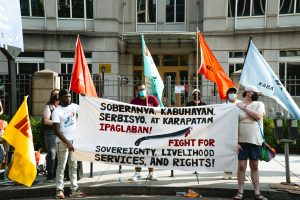Peoples’ State of the Nation Address 2024 exposes overall state of crisis, US militarization in the Philippines
Peoples’ State of the Nation Address 2024 exposes overall state of crisis, US militarization in the Philippines

WASHINGTON, DC – Nearly 100 Filipino students, workers, community members, and solidarity allies from the DC-MD-VA (DMV) region launched and mobilized to the DMV “Peoples’ State of the Nation Address” at the Embassy of the Philippines on Sunday, July 21 to oppose President Ferdinand “Bong Bong” Marcos Jr.’s third State of the Nation address, which marks his second year in power. The contingent amplified calls for genuine sovereignty, livelihood, services, and rights for Filipinos, as President Marcos Jr. continues to allow the U.S. access to the country’s natural resources, military bases, and economy.
 Economy
Economy
Jhong Delacruz, a registered nurse and member of overseas Filipino workers alliance Migrante, stated that with price increases on basic needs across Asia, Marcos Jr.’s use of the Labor Export Policy (LEP) will only continue to extract money from Filipinos across the diaspora while only giving miniscule daily wage increases amounting to “35 PHP” (0.60 USD as of writing), not even half of family living wage (IBON Foundation) and limited to only for Metro Manila.
“It’s a slap in the face and yet another push to leave our motherland! BBM’s push to continue Labor Export Program [50 years since it was institutionalized] reveals he is no different from his father. More Filipinos are leaving the country every year under Marcos than compared to Duterte,” Delacruz said.
As the value of the Philippine peso continues to plummet, more Filipinos face displacement and are forced to find work abroad, sending nearly all their earnings to family in the Philippines. In 2023, statistics show that 2.3 million Filipinos left the country in search of opportunities as Overseas Filipino Workers (OFWs). Once abroad, Filipinos often find themselves as workers in healthcare, education, factories, and the fast food industry.
The average daily wage of Filipinos in the Philippines is approximately $10 USD per day, which is not enough to access basic necessities, and those with family abroad as OFWs rely on remittances to get by daily. Jollibee, a fast food company, champions itself as a “family-friendly” business, yet they make it difficult for working Filipinos to provide for their families due to lack of fair and proper compensation.
“[Jollibee] proudly boasts its plans to expand store locations by the hundreds, just in the next year alone. Working at the counter, I’ve seen the prices on the menu increase by dollars, while our wages increase by mere cents, yet the company claims there is ‘no room in the budget’ for holiday pay,” said Cat Bartolome, a Jollibee Wheaton worker who came to speak on behalf of the workers, who had submitted a petition asking for holiday pay at the end of December 2023.
Jollibee/Honeybee Food Corporations is owned by Tony Tan Caktiong, whose current net worth is 1.2 billion USD, making him one of the richest Filipinos. “[Caktiong] makes billions off the labor of thousands of Filipinos and Jollibee workers worldwide, who fund his life of luxury. Our ask for holiday pay is nothing, but a very small percentage of the wealth that capitalists like Caktiong and Marcos steal from their own people,” Bartolome added.
 Militarization
Militarization
As tensions rise over the West Philippine Sea, the Philippines finds itself caught between the imperialist crossfires of China and the United States. Rachael Joslow, a member of Anti-Imperialist Action (AIA) at UMBC, relayed their firsthand observations attending the BAYAN Peace Mission with respect to US bases in the Philippines: “I can tell you that the Filipino people do NOT want the US military there,” adding that residents of Ilocos Norte “are terrified that war is already at their doorstep. While missiles were being launched into the ocean, residents had to sit back as they saw their roofs shaking from the explosions.”
Joslow continued, calling for attendees to “reject further US military funding to the Philippines through the PERA act, support the PHRA that suspends US supplying security assistance to the Philippines state until human rights improve through basic reforms!” The Philippine Human Rights Act (PHRA), initially introduced to Congress in 2021 following the passing of the Anti-Terror Law in the Philippines, would suspend all military aid to the Philippines until human rights violations cease.
Meanwhile, the Philippine Enhanced Resilience Act (PERA), introduced on April 10, seeks to do the opposite of the PHRA, by promising $2.5 billion to Philippine state forces over the next five years. The most oppressed people in the Philippines—the working class in urban centers and peasants in the countryside—will undoubtedly face even more state-endorsed violence and political repression funded by PERA. “Marcos Jr. sits comfortably in Malacanang [Presidential Palace] as he primes our country as a battleground for war against China; a war that Filipinos do not want and will die in,” noted Margo Ramirez of Malaya Movement DC.
Activists recalled the AFP assassination attempt on American environmental rights activist Brandon Lee, who was rendered quadriplegic after being shot four times in 2019 while integrating with the indigenous peasants of the Cordillera region. Andrew Bauer [name withheld for security], a member of the Committee for Human Rights in the Philippines at the University of Maryland, otherwise known as TerpCHRP, observed how, “Brandon, and other activists like him, were shot by bullets provided by the United States of America. And the US’ response is to send even more money with the PERA bill.”
For fighting against our campus grooming us and our fellow students to be war criminals, we were also red-tagged. If we did the work we do here in the Philippines, this redtagging would lead to us being jailed or murdered,” Bauer said.
 Education and Upcoming Elections
Education and Upcoming Elections
In additional efforts to oppose Universities and schools part in the military industrial complex, students from universities and schools in the DMV area also amplified calls to increase educational initiatives and programs that give an accurate and pro-people account of Filipino history.
“We and our friends and families in the Philippines are victims to historical revisionism and pro-American education perpetrated by the Marcos regime. Students in the Philippines do not learn about the true horrors of the Marcos dictatorship,” said Arjay Caminar [name withheld for security] a member of Kabataan Alliance DMV. “This is why as Filipino youth in the U.S. we must be the ones that teach the true history of our people: a history of struggle against foreign colonizers and oppressive elites that continues today. While students voice dissatisfaction on the lack of University programs for culturally relevant education, they are also vocal in their opposition to increased militarization on campus, which comes “in the form of funding from military industrial companies like Lockheed Martin”, added Caminar.
The program concluded with calls to continue sharing about the true state of the Philippines, urgency to resist US intervention and provocation in the country, and how Filipinos and people across the world must mobilize against U.S. imperialism and the Marcos regime. “Marcos and Duterte are two sides of the same coin,” Margo Ramirez [name withheld for security] from Malaya Movement DC said, “responsible for the damning record of human rights that currently stains the Philippines and makes it one of the worst countries for human rights and democracy. Now more than ever, we must look to progressive policies and even progressive candidates as the 2025 election comes up. If leaders in the government will not fight for the Philippines we envision, we must hold them accountable for the political violence they are responsible for.”
“We will stand as the people united. We will be the people who will continue to care for the true state of the nation.” added Ramirez
Also present were Mike Lim of Korean diaspora organization Notdutdol and Ali Husseini of Palestinian Youth Movement in a show of solidarity for the Filipino people, drawing the historical parallels of the impacts of US imperialism in their respective homelands with the experience of the Philippines.
The State of the Nation Address is mandated for every fourth Monday of July in the Philippines, where the incumbent president addresses the Legislature [Batasang Pambansa]. It will be held on July 22 this year. The People’s State of the Nation Address is an annual protest and cultural event held to counter and challenge this official narrative across major cities in the US and globally.
PRESS RELEASE
Comments (0)